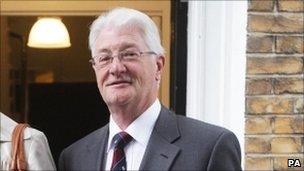Christopher Tappin to be extradited to the US within days
- Published

Mr Tappin faces up to 35 years in jail if convicted in a US court
A former businessman will be extradited to the US within 10 days over charges of conspiring to sell batteries for Iranian missiles, his lawyer has said.
Retired Christopher Tappin, 64, of Orpington, denies unlawfully attempting to export batteries for Hawk air defence missiles.
His lawyer, Karen Todner, said his plea to the European Court of Human Rights had been rejected.
Mr Tappin has previously said he was the victim of an FBI "sting".
In January his attempt to block the extradition through the UK courts ended when High Court judges Lord Justice Hooper and Mr Justice Cranston refused to allow him to take his case to the Supreme Court.
Mr Justice Cranston said time would now begin to run for his removal to the US.
Following the rejection from the court in Strasbourg, Ms Todner said: "The European Court of Human Rights has confirmed that they will not grant Rule 39 relief to Mr Tappin.
"Therefore his extradition to America will take place within the next 10 days.
"We truly hope that the UK Government will see this case as an example of the gross injustice to British citizens by the UK/USA extradition treaty and, as they declared in Opposition, they will now act quickly to make the necessary amendments."
Mr Tappin, from south-east London, is wanted in El Paso, Texas, on a charge of conspiring to export defence articles without licence or approval and aiding and abetting the attempted export of defence articles without the required licence.
He is also accused of intentionally and unlawfully attempting to conduct financial transactions from the outside to a place inside the US, with the intent to promote the carrying on of a specified unlawful activity.
If convicted, Mr Tappin could face up to 35 years in jail. The extradition request says Mr Tappin had been involved in the conspiracy since April 2006.
'Exporting car batteries'
He was charged in 2007 following an investigation by the US Department of Homeland Security, Immigration and Customs Enforcement.
Mr Tappin, the former director of Surrey-based Brooklands International Freight Services, said he believed he was exporting batteries for the car industry in the Netherlands.
Arguing in the Strasbourg court for Mr Tappin, Edward Fitzgerald QC said that extradition would now be oppressive under Article 8 of the European Convention of Human Rights, which protects private and family life, because Mr Tappin was responsible for taking care of his sick wife.
The judge rejected the submission saying "serious offending" was alleged against the retired businessman.
- Published31 January 2012
- Published13 January 2012
- Published22 June 2011
- Published20 June 2011
- Published11 February 2011